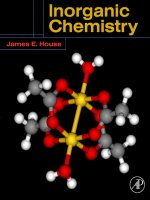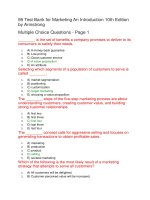Preview SAT subject test. Chemistry, 10th edition by Kaplan Test Prep and Admissions.Recorded Books, Inc.Aldridge, ClaireLee, Karl (2017)
Bạn đang xem bản rút gọn của tài liệu. Xem và tải ngay bản đầy đủ của tài liệu tại đây (2.53 MB, 8 trang )
SAT® Subject Test: Chemistry
TENTH EDITION
Claire Aldridge, PhD
Karl Lee, MA
and the Staff of Kaplan Test Prep and Admissions
SAT® is a registered trademark of the College Board, which
was not involved in the production of, and does not endorse,
this product.
Table of Contents
SAT® Subject Test: Chemistry
Cover
Title Page
Part One: The Basics
Chapter 1: About the SAT Subject Tests
Frequently Asked Questions
SAT Subject Test Mastery
Chapter 2: Getting Ready for the SAT Subject Test:
Chemistry
Content
Scoring Information
Question Types
Strategies
Managing Stress
Part Two: Diagnostic Test
Diagnostic Test
How to Take the Diagnostic Test
Periodic Table of the Elements
How to Calculate Your Score
Answer Grid
How to Use the Results of Your Diagnostic Test
in Your Review
Diagnostic Test
Diagnostic Test: Answer Key
Diagnostic Test: Answers and Explanations
Part Three: Chemistry Review
Chapter 3: Atomic Structure
Subatomic Particles
Atomic Weights and Isotopes
Bohr’s Model of the Hydrogen Atom
Quantum Mechanical Model of Atoms
Electron Configuration and Orbital Filling
Review Questions
Review Questions: Answer Key
Review Questions: Answers and Explanations
Chapter 4: The Periodic Table
Valence Electrons and the Periodic Table
Periodic Trends of the Elements
Types of Elements
The Chemistry of Groups
Review Questions
Review Questions: Answer Key
Review Questions: Answers and Explanations
Chapter 5: Chemical Bonding and Molecular
Structure
Ionic Bonds and Ionic Compounds
Covalent Bonds
Lewis Structures
Types of Covalent Bonding
Geometry and Polarity of Covalent Molecules
Orbital Hybridization
Sigma and Pi Bonds
Review Questions
Review Questions: Answer Key
Review Questions: Answers and Explanations
Chapter 6: Chemical Reactions and Stoichiometry
Molecular Weight and Molar Mass
Representation of Compounds
Types of Chemical Reactions
Net Ionic Equations
Balancing Equations
Applications of Stoichiometry
Limiting Reactants
Review Questions
Review Questions: Answer Key
Review Questions: Answers and Explanations
Chapter 7: The Gas Phase
Measurement of Gas Pressures
Ideal Gases
Kinetic Molecular Theory of Gases
Descriptive Chemistry of Some Common Gases
Review Questions
Review Questions: Answer Key
Review Questions: Answers and Explanations
Chapter 8: The Condensed Phases and Phase
Changes
General Properties of Liquids
General Properties of Solids
Liquid Crystals
Intermolecular Forces
Phase Equilibria and Phase Changes
Phase Diagrams
Review Questions
Review Questions: Answer Key
Review Questions: Answers and Explanations
Chapter 9: Solution Chemistry
Solvation
Solubility and Concentration Units
Dilution
Electrolytes and Conductivity
Colligative Properties
Review Questions
Review Questions: Answer Key
Review Questions: Answers and Explanations
Chapter 10: Chemical Equilibrium
Dynamic Equilibrium
Law of Mass Action
Gas-Phase Equilibria
Heterogeneous Equilibria
Le Châtelier’s Principle
Ionic Equilibria
Review Questions
Review Questions: Answer Key
Review Questions: Answers and Explanations
Chapter 11: Thermochemistry
Systems and Surroundings: The First Law of
Thermodynamics
Heat
States and State Functions
Review Questions
Review Questions: Answer Key
Review Questions: Answers and Explanations
Chapter 12: Chemical Kinetics
Reaction Rates
Changes in Concentration Over Time
Collision Theory, Transition States, and Energy
Profiles
Reaction Mechanisms
Factors Affecting Reaction Rate
Dynamic Equilibrium
Review Questions
Review Questions: Answer Key
Review Questions: Answers and Explanations
Chapter 13: Acids and Bases
Definitions
Nomenclature of Acids
Properties of Acids and Bases
Polyvalence and Normality
Salt Formation
Titration and Buffers
Amphoteric Species
Review Questions
Review Questions: Answer Key
Review Questions: Answers and Explanations
Chapter 14: Redox Chemistry and Electrochemistry
Oxidation States and Assigning Oxidation
Numbers
Balancing Redox Reactions
Oxygen as an Oxidizing Agent and the
Chemistry of Oxides
Electrochemical Cells
Reduction Potentials and the Electromotive
Force
Thermodynamics of Redox Reactions
Review Questions
Review Questions: Answer Key
Review Questions: Answers and Explanations
Chapter 15: Nuclear Chemistry
The Nucleus
Nuclear Binding Energy and Mass Defect
Nuclear Reactions and Decay
Review Questions
Review Questions: Answer Key
Review Questions: Answers and Explanations
Chapter 16: Organic Chemistry
Hydrocarbons
Oxygen-Containing Compounds
Amino Acids
Review Questions
Review Questions: Answer Key
Review Questions: Answers and Explanations
Part Four: Practice Tests
Practice Test 1
How to Take the Practice Tests
Periodic Table of the Elements
How to Calculate Your Score
Answer Grid
Practice Test 1
Practice Test 1: Answer Key
Practice Test 1: Answers and Explanations
Practice Test 2
Periodic Table of the Elements
How to Calculate Your Score
Answer Grid
Practice Test 2
Practice Test 2: Answer Key
Practice Test 2: Answers and Explanations
Practice Test 3
Periodic Table of the Elements
How to Calculate Your Score
Answer Grid
Practice Test 3
Practice Test 3: Answer Key
Practice Test 3: Answers and Explanations
About This Book
Glossary
About the Authors
Copyright Information









